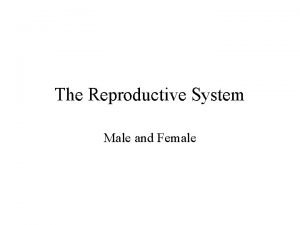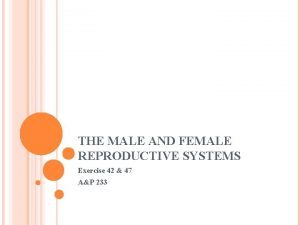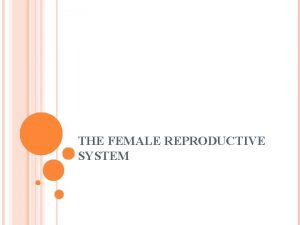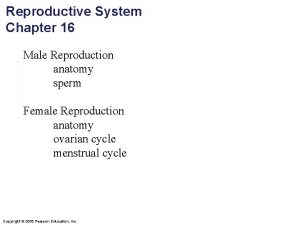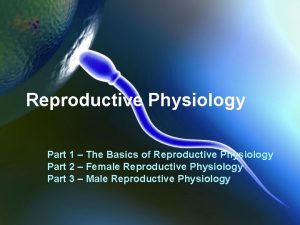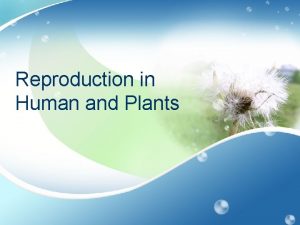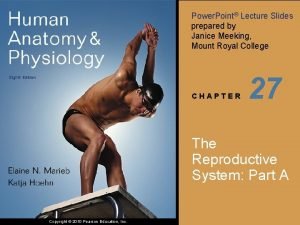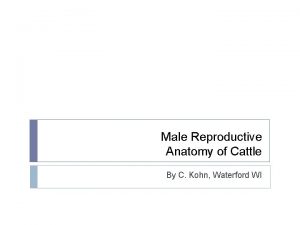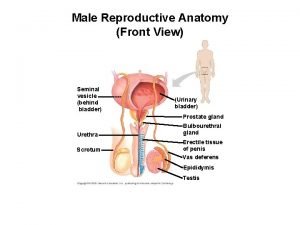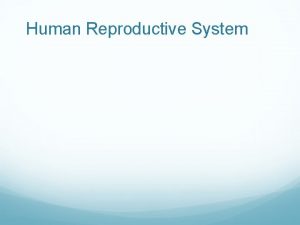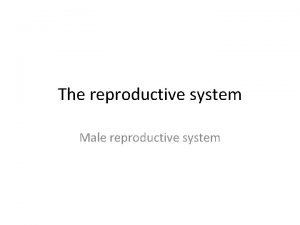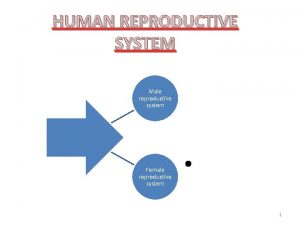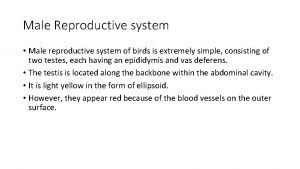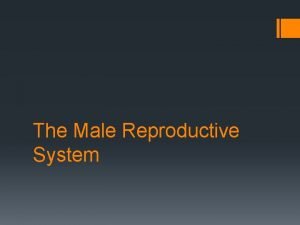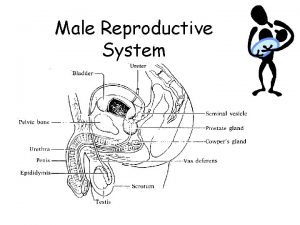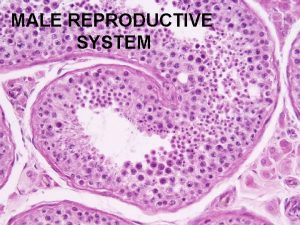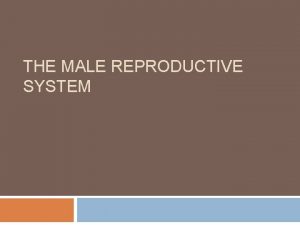Male Reproductive system Male Reproductive system The Male














- Slides: 14

Male Reproductive system


Male Reproductive system • The Male Reproductive System consists of: • testes • ducts: epididymis, vas deferens, urethra • accessory glands: seminal vesicles, prostate glands, Cowper’s gland • supporting structures: scrotum, penis

External Structures: Penis – comprised of 3 columns of erectile tissues • Consists of the Shaft and the Glans Penis – Shaft – contains the urethra which is the passageway for urine and semen – Glans – is highly sensitive (well supplied with sensory receptors) and is located at the dismal end of the penis. » At the tip of the glans is the opening to the urethra » It is covered by a fold of skin, Prepuce/foreskin that is often removed during circumcision. – During sexual stimulation, the penis may become engorged with blood, enlarged, hardened and erect.

External Structures: Scrotum – skin-covered muscular pouch/sac suspended from the perineum. • It contains the testes, epididymis and the lower portion of the spermatic cord. • It is divided into left and right internal compartments by a septum.

External Structures: Scrotum • Beneath the skin is a layer of loose connective tissue and a layer of smooth muscle, called Dartos muscle. – In cold temperature, the dartos muscle contracts, causing the skin of the scrotum to become firm and wrinkled and reducing the size of the scrotum. – An extension of the abdominal muscles into the scrotum the Cremaster muscles contract pulling the testes nearer to the body to raise it’s temperature. – During warm weather or exercise, the dartos and cremaster muscles relax, the skin of the scrotum becomes loose and thin, and the testes descend away from the body to lower their temperature. – If the testes become too warm or too cold, normal sperm cell development does not occur.


Internal Structures: Testes • Testes – considered the male gonads are 2 oval organs, 4 -5 cm long within the scrotum. – Each testes is encased by a protective white fibrous capsule and comprises a number of lobules, each lobule containing interstitial cells/Leydig’s cell and seminiferous tubule. • • Seminiferous tubules produce spermatozoa Leydig cells are responsible for the production of testosterone.

Internal Structures: Epididymis • • Epididymis – a tightly coiled tube about 20 feet long responsible for the conduction of sperm from the testes to vas deferens. It is where some sperm stored and a part of the fluid that surrounds the sperm (semen/seminal fluid) is produced by cells lining the epididymis

Internal Structures: Vas deferens/Ductus deferens • Vas deferens/Ductus deferens – a tube surrounded by arteries and veins and protected by a thick fibrous coating. – It carries sperm from epididymis into the pelvic cavity. – The blood vessels and the vas deferens together are referred to as a spermatic cord.

• Seminal vesicle - 2 convoluted pouches that lie along the lower portion of the bladder and empty into urethra by way of ejaculatory ducts. – These glands secrete a viscous portion of the semen which has a high content of the basic sugar and is alkaline in p. H.

Internal Structures: Prostate Gland • Prostate Gland – lies just below the bladder. – It secretes a thin alkaline fluid that when added to the secretion from the seminal vesicle and sperm from the epididymis further protects the sperm from being immobilized by natural low p. H (acidic) level of the urethra due to passage of urine through the same lumen.

Internal Structures: Urethra • Urethra – hollow tube leading from the base of bladder, passing through the prostate gland, continues to the outside through the shaft and glans penis.

Internal Structures: Cowper’s glands • Cowper’s glands – lie beside the prostate gland by short ducts empty into the urethra. – They secrete an alkaline fluid that helps counteract the acid secretion of the urethra and ensures safe passage of spermatozoa
 Function of the vagina
Function of the vagina Reproductive system function
Reproductive system function Female testes
Female testes Exercise 42 anatomy of the reproductive system
Exercise 42 anatomy of the reproductive system Oogenesis process
Oogenesis process Round ligament of uterus
Round ligament of uterus Female and male reproductive system
Female and male reproductive system Produces a lubricating mucus that cleanses the urethra
Produces a lubricating mucus that cleanses the urethra Luteinizing hormone in male reproductive system
Luteinizing hormone in male reproductive system Male reproductive system of a plant
Male reproductive system of a plant Art-labeling activity: the male reproductive system, part 1
Art-labeling activity: the male reproductive system, part 1 Male reproductive system information
Male reproductive system information Where is the sperm located
Where is the sperm located Bull reproductive system parts and functions
Bull reproductive system parts and functions Seminal vesicle
Seminal vesicle


